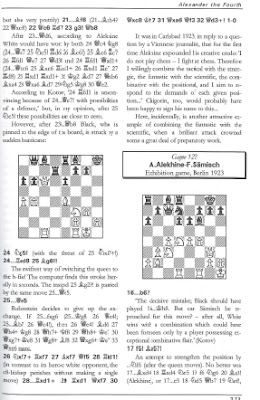Here's the diagrams, to which Ray refers in his notes.
Here's the introduction.
Here's the game itself.
And here's the conclusion.
An interesting column, I thought. An interesting game with particularly interesting notes. All the more interesting when you find out where Ray plagiarised them from.
Well, what else would you expect from a plagiarist of world championship class?
The first part of Garry Kasparov's My Great Predecessors was published by Everyman Chess in 2003. It was apparently described as
the most important chess book ever to appear since Bobby Fischer's My 60 Memorable Games, three decades or so agoby Ray Keene in the Times. In the book the Alekhine-Rubinstein game appears on pages 371-3, which pages we reproduce below.
Don't worry if it's a bit small, we'll be reproducing the plagiarised bits in larger size later on. Here's the game and notes again.
The above is the online version: below is a copy of the version that appeared in print.
With one exception I've used the online version in the notes below as it reproduces better. (With that single exception I think they are textually identical, though the layout differs.)
Let's go through it, note by plagiarised note.
Ray's first note comes after White's twelfth move. There's also a note after White's twelfth move in My Great Predecessors. Compare and contrast, below.
As you can see, Kasparov is quoting Botvinnik, whose commentary Ray copies word-for-word - but without mentioning either individual (or indeed My Great Predecessors) here or anywhere else in the text. A double plagiarism, one might call it.
In the next note, the only difference is the removal of the ungrammatical "the" that appears in My Great Predecessors. The rest is word-for-word plagiarism.
The next note does acknowledge the original source - Alekhine - but only because My Great Predecessors does so, in precisely the same words, which Ray hence plagiarises. "In Alekhine's opinion, the decisive mistake."
The next note: plagiarised word-for-word.
For the next one, Ray cuts a little from the original: but every word of his appears in My Great Predecessors.
The next, however, is once again plagiarised word-for-word.
The one that follows* omits a sentence from My Great Predecessors but is otherwise also word-for-word, save for excising an exclamation mark and the marking ?! with which chess annotators indicate a dubious move.
Dubious? Ray's journalism is worse than dubious. He wraps up with a passage which is not only plagiarised word-for-word, but in which the variations given, complete with markings, are identical to those appearing in My Great Predecessors.
In fact, every word of Ray's annotations is plagiarised from the notes in My Great Predecessors. Every word except for this:
and this.
When I said that Ray referred to the diagrams in his notes, I could have added that those references were the only part of those notes that are actually his.
Amazing stuff - or amazing if you're not accustomed, long since, to Ray's literary pilfering.
It scarcely seems worth mentioning the curious borrowing of the word credo which appears immediately after the game both in My Great Predecessors and in the Spectator piece
if only because it's like finding DNA evidence at the scene of the crime when the suspect has been caught on CCTV, has been apprehended in possession of the stolen goods and there are any number of witnesses. That just leaves the confession, which I don't suppose we're going to get.
The wholesale use of the notes from My Great Predecessors is an act of pure plagiarism blatant even by Ray's considerable standards. Alexander Alekhine may have had "an ingeniously creative mind", but Ray just plagiarises other people's work.
It is not, of course, the first time that Ray has engaged in plagiarism in the Spectator, though it ought to be the last. But one wonders - now Ray's even plagiarised Garry Kasparov, who is there left to plagiarise next?
[* I've used the print version here as the online version doesn't quite correctly transcribe the original.]
[Thanks to Jonathan and Sean]
[Ray Keene index]

































6 comments:
I understand the link in the final paragraph wasn't working: it has now, hopefully, been replaced with a functioning link.
There are many responses I have about this, but one of them is sadness.
This afternoon I received in the post a copy of Ray's old book "The openings in modern theory and practice". I'd love to be able to tweet RDK and tell him how pleased I am to pick up a copy. Shame that I can't really now.
One would have thought that such a column would be a sackable offence if brought to the attention of The Spectator? Presumably you are not writing to the editor in order to save Mr Keene, who I understand has had this column for a long time. That is noble but is it wise?
Maybe Keene just copied from himself?
Surely, Kasparov had a ghost writer. I can hardly come up with anyone more appropriate than Keene.
The evidence for the contention is nil, though, isn't it?
Not only is the evidence for the proposition nil, there is also evidence against.
Aside from that, even if it were true it doesn't stop the plagiarism being plagiarism. Ghostwriters don't get rights to what they write. That's why they're called Ghosts.
Other than that, it's a sensible, well thought out suggestion.
Post a Comment